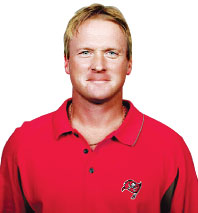
Last week former Buccaneers coach Jon Gruden replaced Tony Kornheiser as the third man in ESPN’s Monday Night Football broadcast booth. It was only the latest triumph for a wave of what might be called sports technocrats—detail-crazy, film-study-obsessed analysts who are, hearteningly, taking over the airwaves.
Three years ago, ESPN hired Kornheiser, then a Washington Post sports columnist, for MNF. Bringing him in made a certain amount of sense at the time. Kornheiser was a success on ESPN’s Pardon the Interruption, a show in which he and fellow Post columnist Michael Wilbon argued about the sports news of the day, and ESPN wanted that same energy in the booth. Kornheiser didn’t join MNF to talk about blocking techniques and disguised coverages. He was there to create story lines and argue about personalities: Should Coach X get fired? Is player Z a good enough “leader”? And can you believe the shenanigans that Terrell Owens is getting up to?
It seemed like smart business—this is what state-of-the-art cable does, from Fox News to MTV: endlessly focus on celebrity and conflict. In addition to hiring Kornheiser, ESPN launched a show called ESPN Hollywood in 2005 and hired Rush Limbaugh for its football pregame show in 2003. But none of this worked, and while Kornheiser says his departure is related to a fear of flying, three years of bad reviews couldn’t have encouraged him to stay.
Gruden impressed during a brief stint on the NFL Network, garnering a reputation for the considerable depth of his football knowledge and his ability to convey that knowledge in clear terms. Like Ron Jaworski, Brian Baldinger, Cris Collinsworth, and ABC-ESPN basketball commentator Jeff Van Gundy, the ex–Knicks coach, Gruden simply knows his sport. (Jaworski has emerged as a star—on MNF, no less—because of almost frighteningly diligent research and preparation.)
It turns out that sports fans care a lot less about tales of Warren Sapp’s old locker-room pranks than they do about whether Chien-Ming Wang will fix his sinker in time to save their fantasy team. Think about it this way: When the Internet let fans create their own content, they didn’t fill their blogs with the substanceless pronouncements (“Brett Favre just knows how to win games”) and profile fluff (“Today, one lucky children’s leukemia ward got a Michael Strahan–size surprise”) that you can see on TV. They started discussing teams and games in detail, writing thousands of words about minor roster moves and strategic decisions. Networks have finally noticed.
There are still Chris Bermans and Terry Bradshaws, “entertainers” mugging to boost their own Q ratings. But the nerds are emerging. In five years, there aren’t going to be many broadcasters left for Frank Caliendo to impersonate. John Madden is gone, Tony Kornheiser is gone, and Howard Cosell would never be hired. The only analyst who consistently rides the line is TNT’s Charles Barkley (who’s as observant as he is casually hilarious), and he’s the exception that proves the rule: There are plenty of failed imitators who’ve proved it’s a lot harder than he makes it look. When in doubt, just tell us the score and how it got that way.
